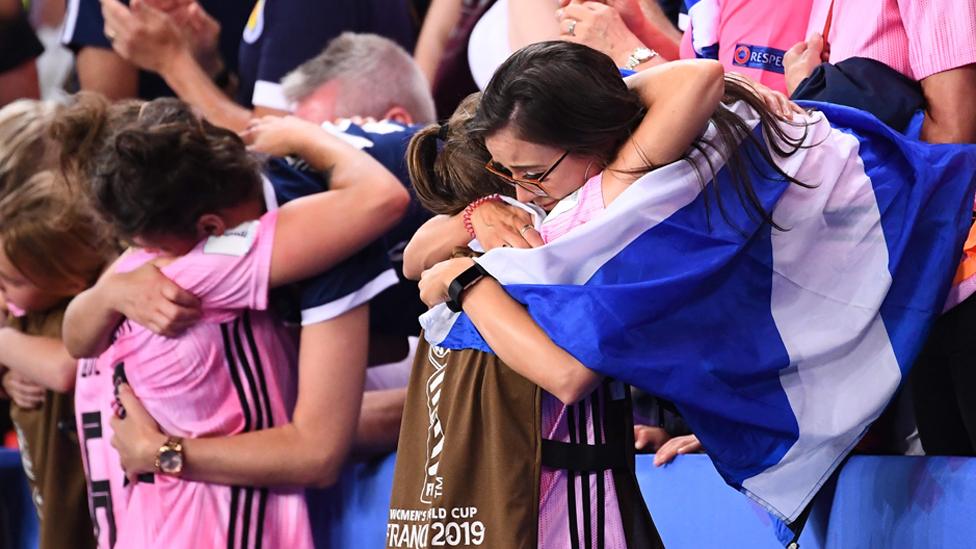Women's World Cup 2019: What we learned from the historic tournament
- Published
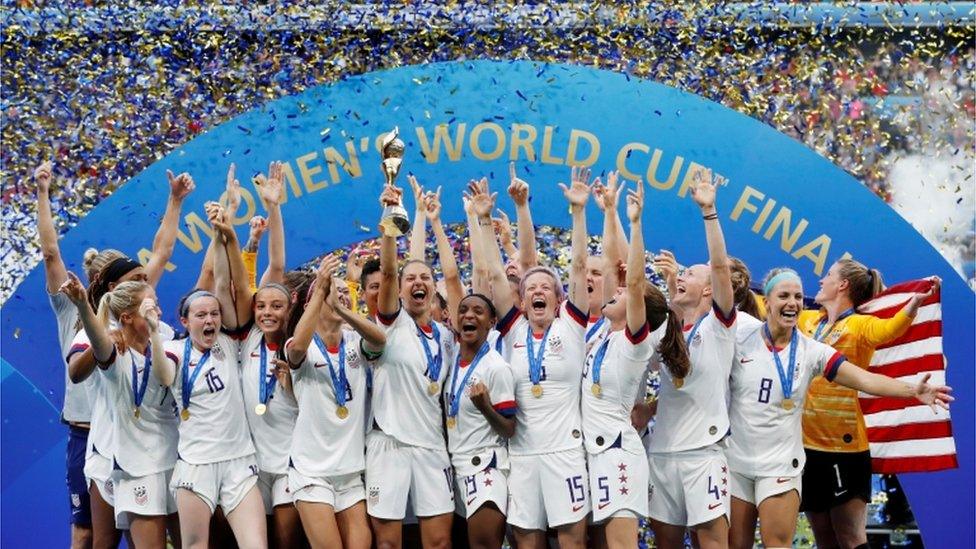
On Sunday, the US Women's National Team (USWNT) defeated the Netherlands 2-0 and won the Fifa Women's World Cup for the fourth time.
This year's tournament has broken records and seen its fair share of debate - on politics, politeness and otherwise.
Here's what we've learned from the 2019 Women's World Cup.
We know Megan Rapinoe
She may have been a star in women's football before France 2019, but now Megan Rapinoe has name recognition across the world.
Rapinoe took home the Golden Boot, the Golden Ball, and won Fifa player of the match during the final, but she also made headlines for criticising President Donald Trump and championing LGBT rights and women's equality in football.
Are USA women footballers more famous than men?
On social media, she became the most mentioned player of the tournament. Fans praised the 34-year-old co-captain for standing up for her beliefs as well as her prowess on the field - with some joking that she would technically be eligible to run for president against Mr Trump in 2020.
A Washington Post columnist dubbed her sportsperson of the year, and Elle magazine crowned her "the internet's new girlfriend".
This was certainly Megan Rapinoe's World Cup.
Thirteen goals in a World Cup game is possible
The USWNT achieved the biggest ever win margin in World Cup history when they soundly defeated Thailand 13-0. Germany held the previous record, defeating Argentina 11-0 in 2007.
Star player Alex Morgan scored five goals, with six others, including Rose Lavelle and Megan Rapinoe, also finding the back of the net.
But the tournament favourites were met with backlash over the thrashing, with football fans divided over whether or not the goals (and their celebrations) were excessive.
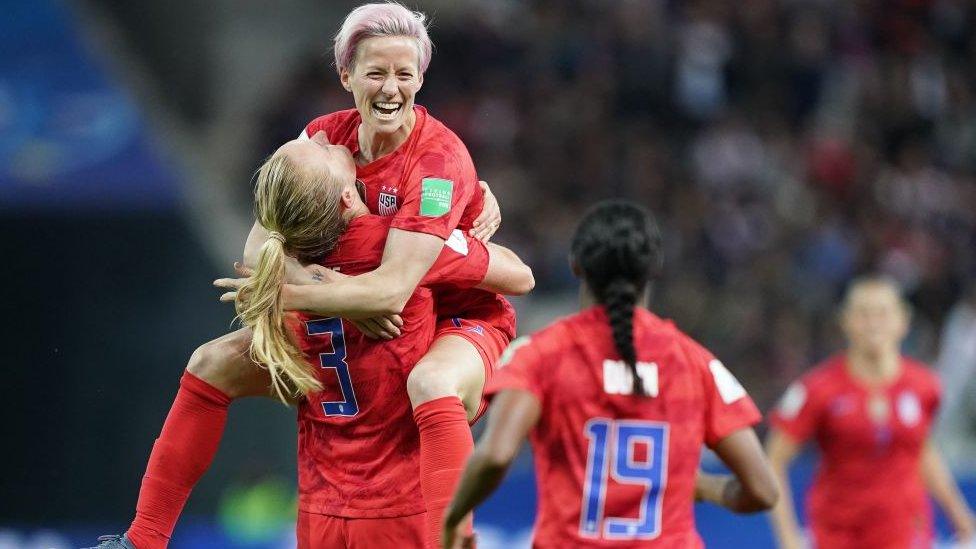
Midfielder Sam Mewis (left) hugs forward Megan Rapinoe (centre) after scoring a goal against Thailand
Former Canadian footballer Kaylyn Kyle called it "classless behaviour", while retired US men's team player Alexi Lalas defended the women's team, saying it was not their "problem or responsibility" since "the US is there to win, not to make friends".
Morgan - who celebrated all her goals - told ESPN it was "disrespectful" to show up and not play their best, and that the celebrations were because "these are goals that we have dreamed of our entire lives".
Tea drinking goal celebrations can cause an uproar
The USWNT's first match was not the only time their celebrations came under scrutiny.
Morgan mimicked drinking a cup of tea after she scored the winning goal against England in the semi-final match. She said the gesture was about the phrase "that's the tea", a slang term for gossip, not an insult to England.
Her celebration came days before America's Independence Day, and the New York Post deemed it the best diss since Boston dumped British tea into the sea in 1773.
But some in England were less appreciative of the jest, with Morgan's former team-mate, English forward Lianne Sanderson, calling it "distasteful".
Morgan later pointed out a double standard when it came to male vs female celebrations.
Morgan defends goal celebration against England
"We have to celebrate but not too much, we have to do something, but it always has to be in a limited fashion," Morgan said.
Rapinoe also defended her co-captain and team, telling reporters: "Wah, wah, wah. We're at the World Cup, what do you want us to do?"
"I don't think anyone truly believes that we disrespect the game or disrespect our opponents."
The penalty curse isn't just on England's men's team
England's captain Steph Houghton took a late penalty for the team in the semi-final match against the US but it was saved by goalie Alyssa Naeher. Fans bemoaned the penalty curse had struck again.
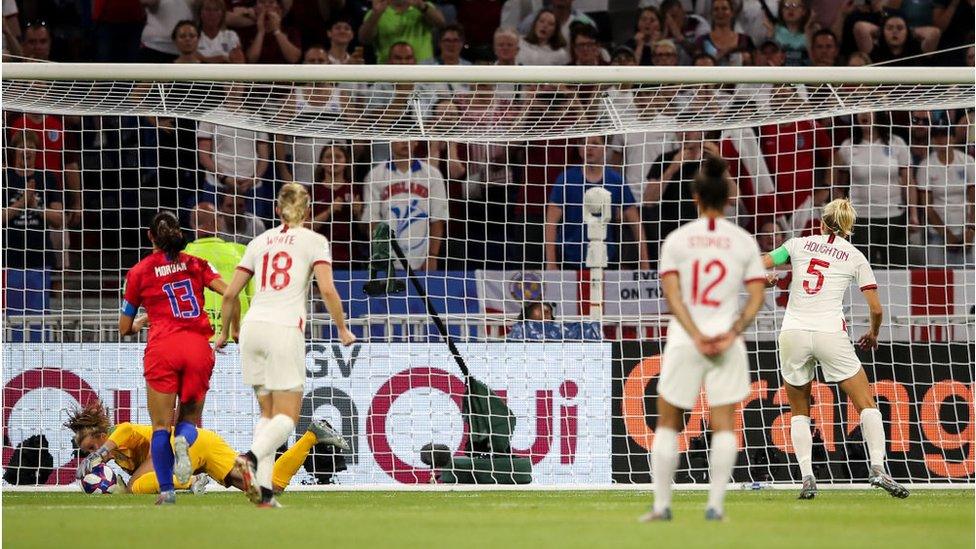
Steph Houghton's penalty is saved by US goalkeeper Alyssa Naeher
The miss marked the third time the women's team missed penalty kicks in the 2019 tournament.
In 2018, the men's team finally broke their decades-long penalty curse during a match against Colombia, after having never won a World Cup penalty shootout before.
Spying rows aren't just between governments
The emotional England v US match was preceded by a spying scandal when US staffers were seen around the Fourviere Hotel while the English team was practising there before the match.
England boss Phil Neville questioned the US team's "etiquette", but said it was "not a concern" and would have "no bearing on the game".
US coach Jill Ellis meanwhile said staff were only there to check out the hotel - a part of "pretty normal" planning and preparation.
The fight for equal pay has gained even more supporters
Celebration and spying drama aside, gender pay inequality may be the biggest takeaway this year.
As the winners received their medals, chants of "equal pay" echoed throughout the stadium. According to Twitter, there were five times more tweets about "pay" after the win.
The USWNT is currently suing the US federation over gender discrimination - a lawsuit that was announced on International Women's Day, 8 March, this year.
According to the lawsuit, in addition to base pay differences, the US men's team received over $5m (£3.9m) in bonuses after they lost the 2014 World Cup, while the women received just under $2m after they won the 2015 World Cup, US media report.
These differences are despite the fact that the USWNT generates more revenue for the federation than the men's team in recent years.
This video has been removed for rights reasons
During this year's tournament, Rapinoe criticised Fifa, saying: "I don't think that we feel the same level of respect, certainly, that Fifa has for the men".
Shortly after Sunday's win, Molly Levinson, the team's spokeswoman for the equal pay lawsuit, said in a statement: "At this moment of tremendous pride for America, the sad equation remains all too clear, and Americans won't stand for it anymore.
"These athletes generate more revenue and garner higher TV ratings but get paid less simply because they are women. It is time for the federation to correct this disparity once and for all."
- Published7 July 2019
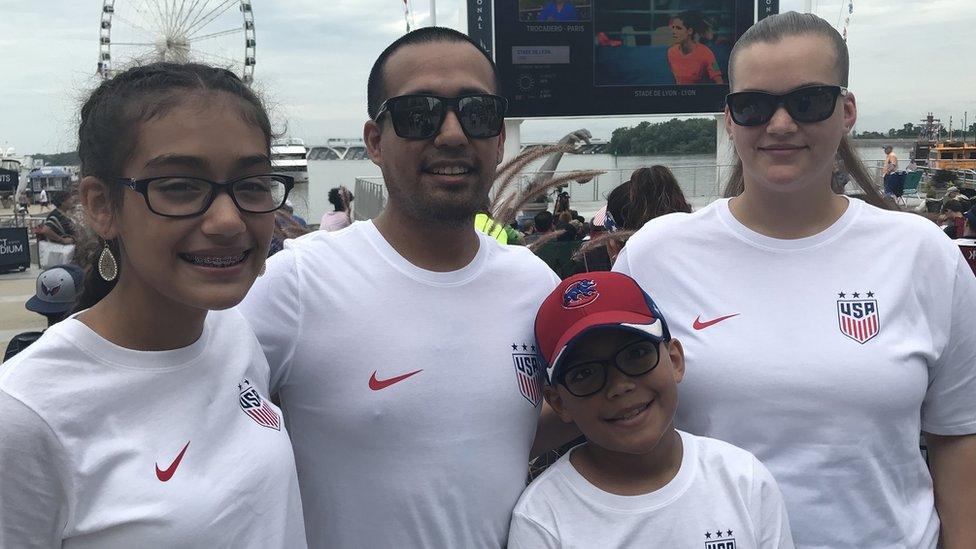
- Published8 July 2019
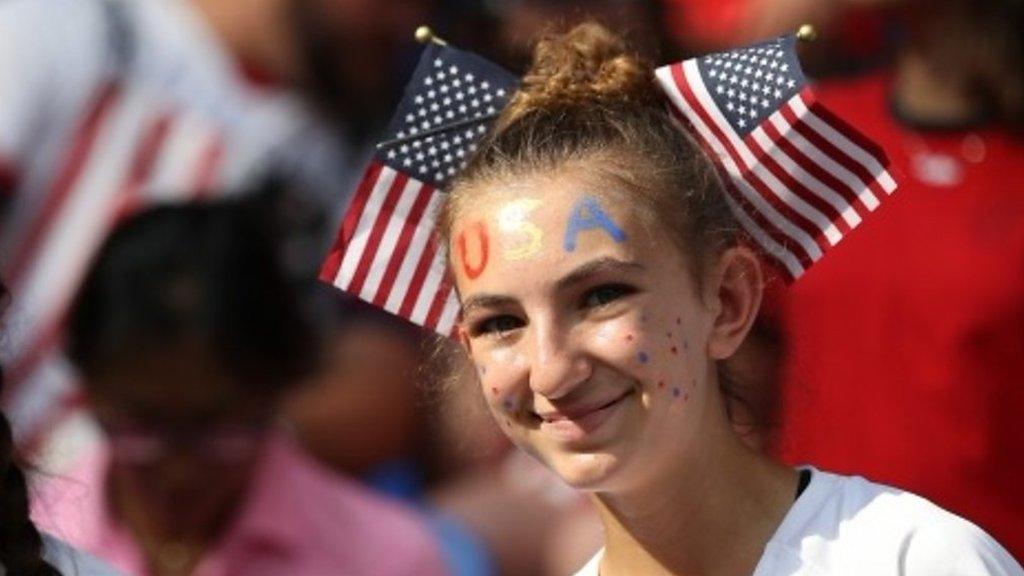
- Published8 July 2019
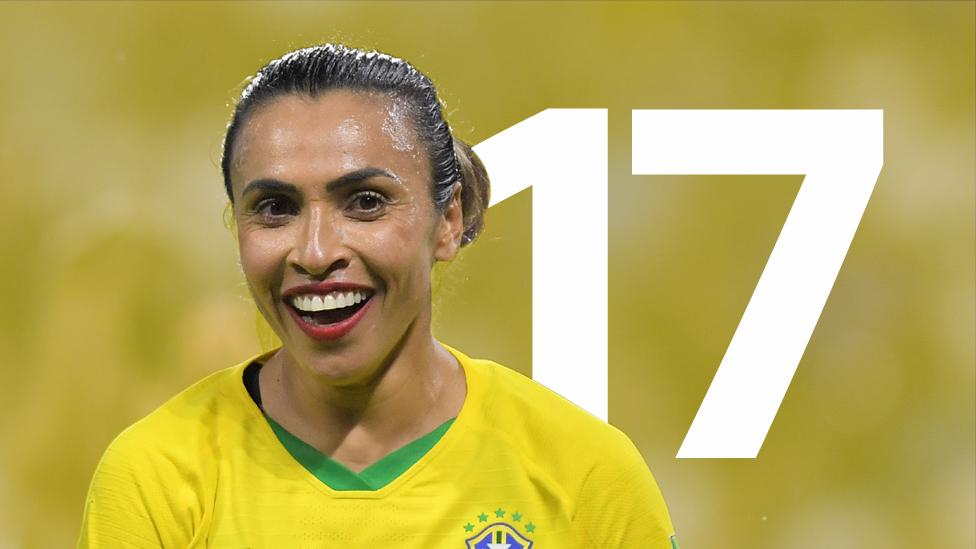
- Attribution
- Published7 July 2019
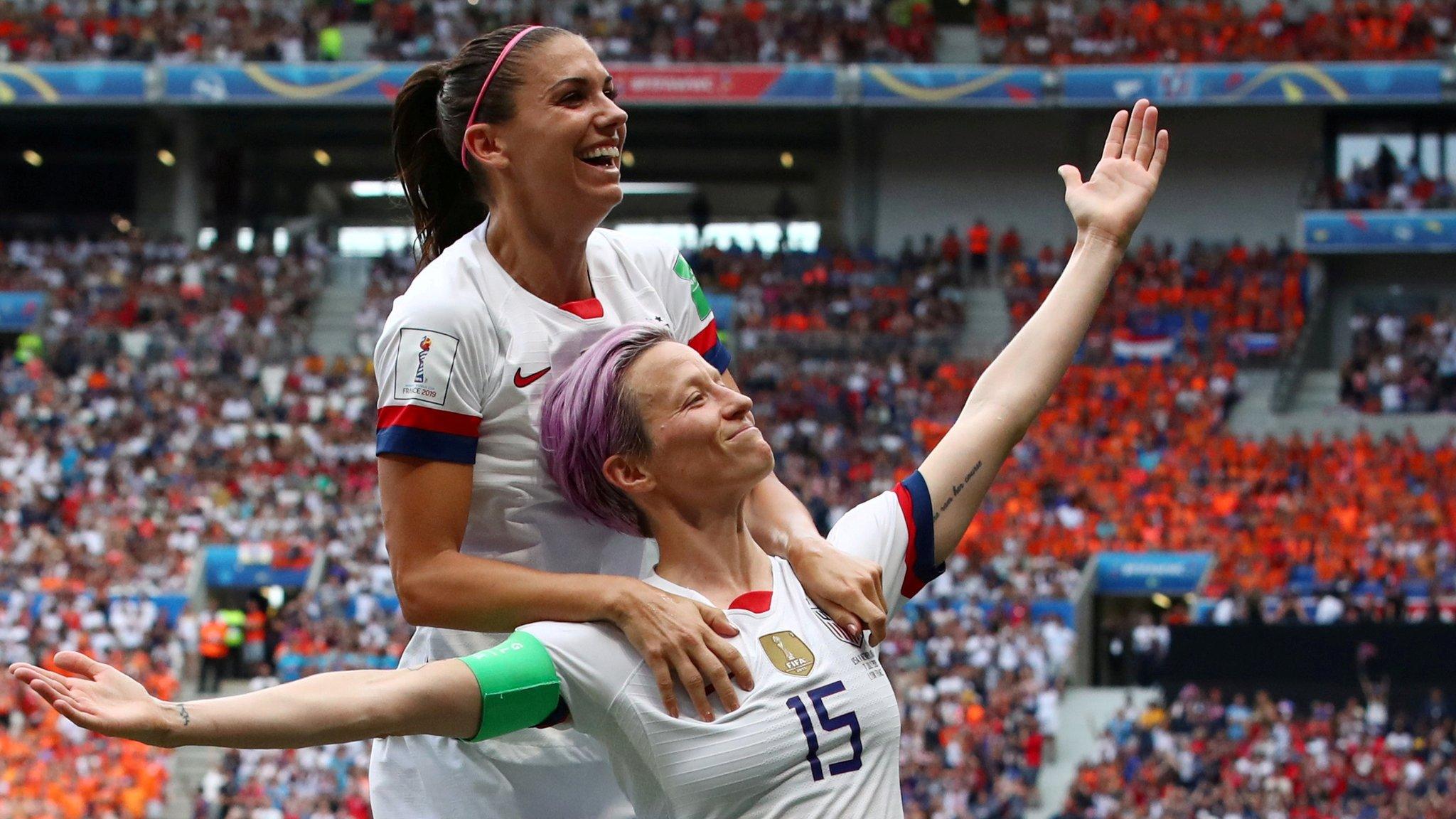
- Published8 July 2019
